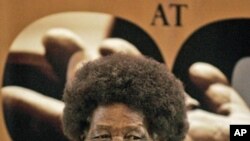Albertina Sisulu, anti-apartheid struggle icon, has died suddenly at her home in Johannesburg.
Ma Sisulu, as she was fondly known across South Africa, died unexpectedly at her family home late Thursday. In announcing the death, her son Mlungisi Sisulu says she was, as always, at the center of family activities.
“Sitting in a chair watching the news, as they prepared supper," said Mlungisi Sisulu. "And all of a sudden she slumped to one side. We are really saddened because she was in good health, she was actually jolly this afternoon. And at 92 she was fairly healthy, but that is how it has happened, she has passed on.”
Born Nontsikelelo Albertina Tetiwe in the Tsomo district of the Eastern Cape on October 21, 1918, the second of five children, Sisulu was orphaned as a teenager and forced to take care of her younger sisters. She moved to Johannesburg in 1940 to train as a nurse, a career choice which importantly enabled her to earn a wage as she studied and trained.
It was in Johannesburg that she met anti-apartheid struggle activist Walter Sisulu, and the couple married in 1944. It was her husband who drew her into the struggle and soon she became a political leader in her own right.
In a 1994 interview, Walter Sisulu told VOA that when he became secretary-general of the ANC in 1949, he was only able to accept the responsibility because the woman he described as remarkable, made it possible.
“When I took up the position of being a secretary-general, that very night I knew, finished with me: I can't go to business, I can't be employed, I've got a duty to the people," said Walter Sisulu. "Changed my whole approach. What was I going to depend on? I was not paid a salary, I wasn't going to earn anything. I depended on my wife. I say remarkable, because with no means she was able to keep the family together.”
In 1964 Walter Sisulu was jailed along with Nelson Mandela and other African National Congress leaders and Ma Sisulu was left to support and raise her children quite alone. But her political activities continued and she was detained without trial, jailed, tortured several times and finally placed under a banning order which meant she could not meet with more than one person at a time, and could not be quoted. Another veteran activist, Amina Cachalia earlier told VOA it was a terrible burden, always born with grace and dignity.
“And hers was such a tremendous responsibility to keep that family together, [she was] sometimes in jail, and sometimes away, and sometimes being tortured, and he in prison - so it was tremendous loss for her and I think if anybody deserved a better deal, it would be Albertina," said Amina Cachalia.
After her banning order expired in 1983, Ma Sisulu became president of the newly launched United Democratic Front, an organization formed to revitalize and reorganize the anti-apartheid struggle in the absence of the outlawed African National Congress and other political organizations.
In 1994, with the advent of democracy in South Africa, Ma Sisulu was given the honor of nominating Nelson Mandela for election by parliament as president of the country. She served one term as a legislator before retiring.
Tributes have been pouring in from South Africa and abroad. In a statement on behalf of its founder, the Nelson Mandela Foundation said Mandela held her in high regard, saying she was “wise and wonderful.” The Foundation said South Africa has lost a treasure.
Much Loved Veteran of Anti-Apartheid Struggle Sisulu Dies at 92




